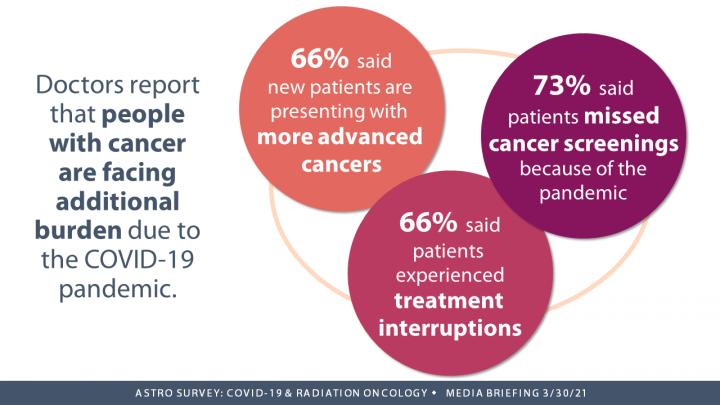COVID-19 Led to More Advanced-Stage Cancer Diagnoses
 Doctors who oversee cancer clinics say that new patients are arriving for treatment with more advanced disease than before the COVID-19 pandemic, according to a new survey from the American Society for Radiation Oncology (ASTRO). The national survey of radiation therapy practice leaders fielded this winter also indicates that treatment postponements and deferrals that were common a year ago have largely subsided and that clinics continue to use a variety of enhanced safety measures to protect their patients and staff.
Doctors who oversee cancer clinics say that new patients are arriving for treatment with more advanced disease than before the COVID-19 pandemic, according to a new survey from the American Society for Radiation Oncology (ASTRO). The national survey of radiation therapy practice leaders fielded this winter also indicates that treatment postponements and deferrals that were common a year ago have largely subsided and that clinics continue to use a variety of enhanced safety measures to protect their patients and staff.
"One year into the COVID-19 pandemic, we already see the consequences of pandemic-driven drops in cancer screening and diagnostics," said Thomas J. Eichler, MD, FASTRO, Chair of the ASTRO Board of Directors.
Two-thirds of the radiation oncologists (66%) said new patients are presenting with more advanced-stage cancers. Nearly three-fourths (73%) said physicians in their practice are noticing that patients are not receiving cancer screenings, and many also said existing patients experienced an interruption in their radiation treatment due to the pandemic (66%).
"Because the pandemic and cancer cause disproportionately more harm for Black and other medically underserved populations, these rates may be even higher for some vulnerable communities," added Dr. Eichler.
Enhanced safety protocols remain widespread at radiation therapy clinics. Masking for patients and staff (99%), social distancing in the clinic (100%) and screening patients and staff for COVID-19 exposure (95%) are nearly universal. Increased sterilization (93%), face shields for staff during procedures (80%) and no-visitor policies (73%) are also common.
"Safety is at the core of radiation oncology, and clinics were ready to adapt quickly and ramp up protective measures that keep their staff and patients safe from COVID-19 exposure," said Dr. Eichler.
The survey also found that clinics have largely stopped deferring or postponing radiation treatments. Only 15% reported postponing treatment in January/February 2021, compared to 92% in April 2020. Similarly, 12% reported deferring any new patient visits in 2021, compared to 75% in the early weeks of the pandemic.
Four in 10 practices still reported difficulty accessing personal protective equipment, medical-grade hand sanitizer or other critical supplies in the initial months of 2021. More alarmingly, many physicians said that COVID-19 vaccination efforts at their practice were limited by access to the vaccine (53%), and by hesitation to receive the vaccine among staff (59%) and patients (52%). The high rates of hesitancy echo findings that more than half of frontline health care workers in the United States were unvaccinated as of early March 2021.
ASTRO recently joined a coalition led by the American Cancer Society and National Comprehensive Cancer Network to encourage the American public to resume cancer screening and treatment, emphasizing that cancer won't wait until the pandemic ends. ASTRO also updated its COVID-19 clinical guidance to include support for COVID-19 vaccination for people receiving radiation therapy, as long as the individual does not have increased risk of a reaction to the vaccine. Patients are encouraged to consult with their radiation oncologist regarding timing and location of the injection.
Additional Survey Findings
The pandemic is not affecting clinics equally. Radiation oncologists at community-based private practices were more likely to report seeing advanced-stage cancers among their patients, compared to those at university-affiliated clinics. PPE shortages and pandemic-related treatment interruptions were also more common at private practices. Differences emerged regarding the COVID-19 vaccine, as well. Both vaccine access and vaccine hesitation were more problematic barriers for clinics located outside of major metropolitan areas (i.e., population <1 million) and for community-based private practices, compared to university-affiliated clinics.
Telemedicine remains popular. More than 8 in 10 clinics (85%) offer telemedicine options for follow-up surveillance visits, and more than half (54%) do so for new patient consultations. Fewer clinics (15%) use telemedicine for clinician assessments of patients who are undergoing radiation treatments.
Radiation therapy clinics continue to face financial and operational challenges created by the pandemic. Patient volume dropped at 73% of clinics due to the COVID-19 pandemic, and visits were down 21%, on average. Most practices (72%) reduced staff at some point due to the COVID-19 pandemic.
Clinics have stayed open, however. One hundred percent of the physicians surveyed said their radiation therapy networks remained open during multiple spikes of the pandemic. Just 7% closed any satellite locations.
Survey Methodology
An online survey was sent by email to 509 radiation oncologists identified in ASTRO’s member database as medical directors of US-based radiation oncology practices, and 117 physicians completed the survey online January 15 through February 7, 2021 (23% response rate).
For more information, you can view the survey report at https://www.astro.org/ASTRO/media/ASTRO/News%20and%20Publications/PDFs/ASTRO_COVID19Survey_2021.pdf.
Citation
COVID-19 Led to More Advanced-Stage Cancer Diagnoses. Appl Radiol.
March 30, 2021